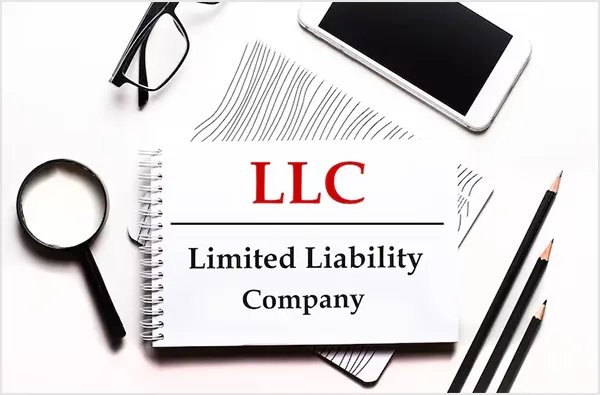Microsoft is particularly considered a stock corporation rather than an LLC.

Starting a new business, firstly, comes with the most crucial decision you’ll have to make is choosing the right legal structure for your dream project. However, there are two different options, LLC and Inc., to select from.
At first, both terms might seem identical, but they have their attributes that deliver a professional look to your company while legally protecting your liabilities.
Therefore, in this informational article, we will guide you to the key difference between LLC and Inc in a simple language, so that you can confidently make a strategic decision for your business growth.
What Does LLC Mean?

An LLC, or a Limited Liability Company, is a unique business structure used by private firms in the United States. This combines the features of a corporation and a sole proprietorship to provide greater flexibility to its members.
Furthermore, an LLC is not classified as a corporation under any state law; instead, it is recognized as a distinct legal form of organization that provides limited liability protection for its owners (known as members) in many jurisdictions.
Likewise, this means if the business is facing any sort of debt or gets sued, the owners’ personal assets, such as property or a car, are not legally held responsible for that.
Accordingly, in difference between LLC and Inc, The LLCs are flexible and easier to set up and run in the comparison to other corporations. They can have one or more owners and decide on their own how they want to get taxed, without attending any regular meetings or maintaining lots of paperwork.
However, there is are certain set of rules, like operating agreements and annual reports, that the LLCs are legally bound to comply with.
In short, a limited liability company is a simple and safe way to start a business, in which you can easily manage your firm and taxes matter while protecting your resources effortlessly.
Learn more about payroll in LLCs
What Does Inc. Mean?

The term “Inc.” is an abbreviation of incorporated, which refers to the legal procedure of forming a corporation. Once the process is completed, the company is recognized as a corporation and significantly uses Inc. after its name. For instance, Apple Inc. and Amazon Inc.
However, when a business turns into Inc., it is considered a separate legal entity apart from its owners. This means a business is now a legal body, and can own property, sign a contract, and be sued, all on its own, rather than in the name of an owner.
One major reason why companies register themselves as an incorporated, is to protect the owners’ possessions, under the name of “limited liability”.
This means if the business has debts or gets sued, the owners won’t lose their money or property, only what they have put into the company.
Being an incorporated company, it is less challenging to raise funding for the company in comparison to LLCs. Similarly, you can easily build a strong relationship with your customers. Incorporated businesses also benefit from structured roles like account managers, who help oversee financial planning, stakeholder communication, and reporting.
However, Inc. has to follow a certain set of rules and constantly submit the file reports to their government. Usually, the board of directors, shareholders have to attend several meetings promptly and maintain the records accurately for future reference.
Briefly, starting your business as an incorporated company is an ideal choice for those who want to grab the public’s attention on an extensive scale and aim for large investments.
What are the Key Difference Between LLC and Inc.?

An LLC and Inc. both help you to develop your business in different dimensions.
While LLC is good for small and medium-sized businesses, as it provides flexibility in managing and running a business. Inc. is a great choice for large-sized businesses, as it assists you to raise money or sell stocks effortlessly.
If you are wondering, “What is the difference between LLC and Inc?”, explore the spectrum below to comprehend the primary differences between the terms.
So that you can go for an appropriate option that perfectly suits your business’s long-term objectives.
Learn the roles of Payee vs Payor
Understand Accounts Payable vs Receivable
| LLC vs Incorporated | ||
|---|---|---|
| Attributes | Limited Liability Company (LLC) | Incorporation (Inc.) |
| Legal Status | LLC is considered a legal entity under state law. | In Inc., a separate legal entity is formed under state law. |
| Ownership Formation | Owned by owners (members). | Owned by the individuals who have bought the company’s stocks. |
| Management Structure | Managed by owners (members) and appointed managers. | Managed by the board of directors (elected by the shareholders). |
| Liability Protection | Protect owners, to safeguard their assets from the business’s debt or legal issues. | Protect shareholders, owners by separating their business and personal liability. |
| Taxation | LLCs have no restrictions on tax treatment, as they can decide how they want to be taxed. | Inc. has to adhere to C-corp taxation, in which they might have to face double taxation. Also, they can opt for S-corp (only if eligible). |
| Capital Structure | Includes members’ contributions, equity, and capital accounts. | Includes debts and equity. |
| Raising Capital | May face several challenges while raising funds from investors. | Easy to raise funds by selling the company’s stocks. |
| Duration | Can have permanent existence, or a specified duration decided by the state law or operating system. | Can have permanent existence unless specified under the corporate law. |
| Credibility | Identify as less credible or established. | Identify as the more credible and established one. |
| Compliance Costs | Lower conformance costs, because of fewer legal formalities. | Higher conformance costs, because of excessive legal formalities. |
| Governance | Supervised by an operating system. | Supervised by bylaws. |
| Name Requirements | “LLC” or “Limited Liability Company” should be after the business name. | “Inc.” or “Incorporated” should be after the business name. |
| Jurisdiction | LLC laws can be different by state, each state has its own legal regulations. | State statutes governed corporate law, providing unified regulations across states. |
Therefore, there is no one such answer for what legal structure is best for your business. Always remember, choosing between LLC and Inc. entirely depends on your business goals.
Firstly, you need to figure out what exactly your company is looking for, and then decide upon one.
Advantages and Disadvantages of LLC and Inc.

LLC and Inc. are two different fundamental options to form a successful business structure that come with their benefits and drawbacks.
However, understanding the pros and cons of LLC corporation is a must to make a smart decision that fits with your business’s requirements and growth.
Thus, check out the spectrum below to comprehend the advantages and the disadvantages of both respective terms.
1. Pros and Cons of LLC

Registering your startups as an LLC may furnish you with numerous benefits, but there might be some drawbacks that you have to face. Let’s see them individually in the given table below.
Briefly, LLC accommodates a balance of easy management, flexible taxation, and legal protection, making it a great choice for small to medium-sized businesses. However, it may not be an ideal option for large-sized businesses that are aiming for big investments.
2. Pros and Cons of Corporation (Inc.)

As an owner of a startup, choosing Inc. for your business may help you attain noticeable growth and recognition worldwide. But also remember, there may be difficulties you have to deal with. Corporate compliance becomes critical, especially with respect to understanding tax codes like the 1257L tax code that may affect employee tax calculations and financial reporting.
Thus, examine the table below to determine the pros and cons of Inc. more precisely.
Therefore, setting up the Inc. business structure will furnish you the strong legal protection and the opportunity to grow extensively. However, you have to deal with the double taxation or excessive paperwork. So, go for this option by carefully contemplating your long-term business objectives.
Factors You Should Consider While Choosing LLC or Inc. for Your Business

Deciding between LLC and Inc. may seem a bit overwhelming at first. But once you comprehend all the aspects of both business structures, you can make more strategic and beneficial decisions for your startups.
Therefore, here we represent some major factors you should cautiously consider while opting for one. Take a look.
1. Liability Protection
Both Inc. and LLCs offer liability protection to the owner of the company. This means if a business has debt or gets sued by another entity, no personal assets, including the house, property, or car of the owner, will not be liable pertaining to it.
2. Implication of Taxes
The corporations are commonly taxed as a C-corp, which may potentially lead to double taxation (corporate tax and personal income tax). However, you can go for the S-corp to save yourself from double taxation only if your business has successfully acquired all the eligibility requirements.
Conversely, LLC offers the pass-through taxation, which means all the profits and losses are directly directed to the owner’s income without adding any corporate taxes.
Moreover, the flexibility in the LLCs’ taxation process permits the owners to choose whether they want to be taxed as a partnership, sole proprietor, S-corp, or C-corp.
3. Ownership and Management Structure
In an LLC, ownership is held by the business’s owners (known as its members). However, it can be managed by its members themselves or by the designated managers, making it easy to manage and run the company.
On the other hand, in a corporation, ownership is held by the shareholders of the business. Whereas, it can be managed by the leading officers and the board of directors, by creating an accurate and authentic body with precise roles and responsibilities.
4. Administrative Formalities
Unlike a corporation, a limited liability corporation does not require any sort of excessive paperwork or regular meetings to attend.
In corporations, the owners are responsible for submitting annual reports regularly and have to attend several meetings to comply with the law of any state.
Conversely, LLCs’ owners have to register their business with the state, create an operating system (optional), get an EIN (Employer Identification Number), submit their annual report, and the rest.
In essence, an LLC is the best option for those who want to establish a simple, flexible, and easy-to-manage business formation. Contrarily, if you want to grow prominently and make more money, you should consider choosing Inc. for your startups.
Final Thoughts
In conclusion, after thoroughly reading this article, we are sure that now you have a clear idea about the difference between Inc and LLC.
But, bear in mind, whether you choose a limited liability company or an incorporated legal structure for your firm, it will surely support and protect your firm from litigation.
Therefore, the structure you decide for your business is just the beginning; what matters most is the work and effort you put into it.
So, concentrate on your goals and also keep learning something new from your marketplace, to boost your company’s growth.





